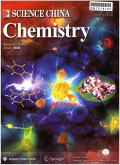- 钛学术文献服务平台 \
- 学术期刊 \
- 基础科学期刊 \
- 自然科学总论期刊 \
- 中国科学:化学(英文版)期刊 \
Recent advances in development of devices and probes for sensing and imaging in the brain
Recent advances in development of devices and probes for sensing and imaging in the brain
基本信息来源于合作网站,原文需代理用户跳转至来源网站获取
摘要:
As the most important part of the central nervous system,the brain is extremely complex in structure and function.In vivo analysis of chemical signals is an essential way to investigate brain activity and function.Although functional magnetic resonance imaging (fMRI) or electrophysiology can be used to record brain activity,they are usually limited by low spatio-temporal fidelity or the difficulty of distinguishing the contributions of various neurochemicals.In addition,the development of in vivo biosensors with high selectivity and accuracy is essential to understand the roles that neurochemicals play in the brain.In this review,we focus on the development of instruments and devices for recording chemical signals in the live brain.Meanwhile,the strategies for development of electrochemical and fluorescent probes with high selectivity,high accuracy and good stability are also summarized.In particular,this review highlighted the contributions of our research group to this field.The development of techniques and probes enable us to understand the brain structure and function,and the mechanism of brain diseases,providing the solution for preventing and treating brain diseases.

推荐文章
内容分析
关键词云
关键词热度
相关文献总数
(/次)
(/年)
文献信息
| 篇名 | Recent advances in development of devices and probes for sensing and imaging in the brain | ||
| 来源期刊 | 中国科学:化学(英文版) | 学科 | |
| 关键词 | |||
| 年,卷(期) | 2021,(6) | 所属期刊栏目 | REVIEWS |
| 研究方向 | 页码范围 | 915-931 | |
| 页数 | 17页 | 分类号 | |
| 字数 | 语种 | 英文 | |
| DOI | |||
五维指标
引文网络
引文网络
二级参考文献 (0)
共引文献 (0)
参考文献 (19)
节点文献
引证文献 (0)
同被引文献 (0)
二级引证文献 (0)
2003(1)
- 参考文献(1)
- 二级参考文献(0)
2005(1)
- 参考文献(1)
- 二级参考文献(0)
2009(3)
- 参考文献(3)
- 二级参考文献(0)
2010(2)
- 参考文献(2)
- 二级参考文献(0)
2011(2)
- 参考文献(2)
- 二级参考文献(0)
2012(1)
- 参考文献(1)
- 二级参考文献(0)
2013(2)
- 参考文献(2)
- 二级参考文献(0)
2014(1)
- 参考文献(1)
- 二级参考文献(0)
2015(2)
- 参考文献(2)
- 二级参考文献(0)
2016(2)
- 参考文献(2)
- 二级参考文献(0)
2019(1)
- 参考文献(1)
- 二级参考文献(0)
2020(1)
- 参考文献(1)
- 二级参考文献(0)
2021(0)
- 参考文献(0)
- 二级参考文献(0)
- 引证文献(0)
- 二级引证文献(0)
引文网络交叉学科
相关学者/机构
期刊影响力
中国科学:化学(英文版)
主办单位:
中国科学院
出版周期:
月刊
ISSN:
1674-7291
CN:
11-5839/O6
开本:
16开
出版地:
北京东黄城根北街16号
邮发代号:
创刊时间:
1950
语种:
eng
出版文献量(篇)
4060
总下载数(次)
0
总被引数(次)
11421
期刊文献
相关文献
推荐文献
- 期刊分类
- 期刊(年)
- 期刊(期)
- 期刊推荐
力学
化学
地球物理学
地质学
基础科学综合
大学学报
天文学
天文学、地球科学
数学
气象学
海洋学
物理学
生物学
生物科学
自然地理学和测绘学
自然科学总论
自然科学理论与方法
资源科学
非线性科学与系统科学
中国科学:化学(英文版)2022
中国科学:化学(英文版)2021
中国科学:化学(英文版)2020
中国科学:化学(英文版)2019
中国科学:化学(英文版)2018
中国科学:化学(英文版)2017
中国科学:化学(英文版)2016
中国科学:化学(英文版)2015
中国科学:化学(英文版)2014
中国科学:化学(英文版)2013
中国科学:化学(英文版)2012
中国科学:化学(英文版)2011
中国科学:化学(英文版)2010
中国科学:化学(英文版)2009
中国科学:化学(英文版)2008
中国科学:化学(英文版)2007
中国科学:化学(英文版)2006
中国科学:化学(英文版)2005
中国科学:化学(英文版)2004
中国科学:化学(英文版)2003
中国科学:化学(英文版)2002
中国科学:化学(英文版)2001
中国科学:化学(英文版)2000
中国科学:化学(英文版)2021年第7期
中国科学:化学(英文版)2021年第6期
中国科学:化学(英文版)2021年第5期
中国科学:化学(英文版)2021年第4期
中国科学:化学(英文版)2021年第3期
中国科学:化学(英文版)2021年第2期
中国科学:化学(英文版)2021年第12期
中国科学:化学(英文版)2021年第11期
中国科学:化学(英文版)2021年第1期

 免费查重
免费查重










